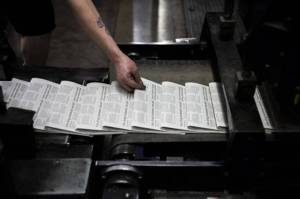Putin offers a real chance to ban bomb
Published 9:00 pm Friday, November 24, 2000
By JOHN O. PASTORE and PETER ZHEUTLIN
While Americans were counting votes in Florida, Russian President Vladimir V. Putin dropped a proverbial bombshell, likely to receive little notice given the postelection chaos. Putin, too, is conducting a recount — of his nuclear weapons stockpile — and the numbers aren’t adding up. With Russia’s military spending down to about $5 billion per year (compared with U.S. military spending of approximately $300 billion per year), and his economy in tatters, Putin knows that trying to maintain nuclear parity with the United States is a losing proposition.
Today, 10 years after the end of the Cold War, the United States and Russia retain tens of thousands of nuclear weapons, many of which, astonishingly, remain on hair-trigger alert, ready to be launched on a moment’s notice. So earlier this month, Putin went beyond previous calls for Russia and the United States to reduce their nuclear arsenals from current levels to 1,500 warheads per side. Without specifying a number, he said reductions could go well below that number. The United States should seize the moment.
The wrong conclusion to draw from Putin’s offer is that the United States should hang tough and simply wait until Russia drops out of the nuclear weapon competition, clinging, perhaps, to a mere few hundred warheads.
First, even with a relatively small nuclear arsenal Russia could wreak incalculable devastation. Indeed, a 1998 New England Journal of Medicine study by Physicians for Social Responsibility reported that just 16 warheads fired at U.S. targets from a single Russian Delta-4 submarine could cause as many as 6 million immediate deaths, and just as many, if not more, injuries from radioactive fallout and other after-effects. Under what circumstances would the United States possibly take such a risk?
Second, Putin’s offer, even if made out of weakness, stands on its own merits, and the United States should accept the challenge. Earlier this year, the United States, Russia and the more than 180 other nations that have signed the Nuclear Non-Proliferation Treaty reaffirmed their obligation under the treaty to abolish nuclear weapons, stating that elimination of nuclear weapons was "an unequivocal undertaking." And, a few weeks ago at the United Nations, the United States voted in favor of a resolution that calls for complete nuclear disarmament under international agreement. While the very last steps in such a process are likely to be the most difficult, the United States can quickly move the world in that direction by reaching agreement with Russia to reduce nuclear arsenals to a few hundred.
Third, the world’s last, best hope of preventing the further spread of nuclear weapons lies in rapid progress toward a global ban on nuclear weapons. Ambassador Richard Butler, the Australian diplomat once charged with overseeing U.N. inspections of Iraq’s nuclear weapons program, recently stated in Boston that all of his experience leads to the conclusion that as long as any nation has nuclear weapons, others will seek them. Jonathan Schell, writing recently in Foreign Affairs, described the status quo this way: "The current American policy is to try to stop proliferation while simultaneously continuing to hold on to its own nuclear arsenal indefinitely."
Under an international ban on nuclear weapons there is, of course, always the risk that a nation might cheat. However, the risks of defying the international norm would be great for a such a state, far greater than in a world where the international norm is a world divided between nuclear "haves" and "have-nots." Indeed, in a world where the current nuclear powers had agreed to abolish their nuclear arsenals, there would be great unity of purpose in stopping would-be proliferators, and ample conventional military power to enforce the international norm.
No treaty is perfect and all entail risks. A treaty banning nuclear weapons would be no exception. But which is the greater risk: to live indefinitely in a world where thousands of nuclear weapons are on hair-trigger alert and more and more nations seek nuclear weapons, or a world in which an outlaw nation might try to harbor a bomb in the basement?
Putin has put before the United States a bold proposal to significantly reduce the risk of nuclear war. The next U.S. president should say "da." It’s time to ban the bomb.


